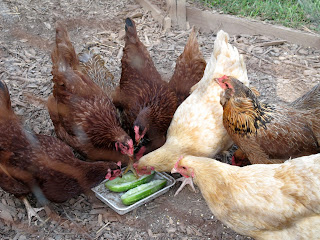 |
| Photo by Doog |
A new report published by the Center for Food Integrity, a consumer research group formed in 2006 by food industry power players (including Monsanto) to study consumer attitudes about the food system, gives interesting insight into the marketing research of Big Agriculture. The "consumer trust survey" used to compile the report asked people a variety of questions that revolved around the U.S.'s responsibility to "feed the world." While it found that support is waning for exporting food to help solve the world hunger problem, which is fascinating in itself, other interesting consumer attitudes came to light as well.
Noting a growing alienation from agriculture, the report states, "consumers aren't sure today's agriculture still qualifies as farming [because of ] generational and geographic distance between farmers and consumers, technological advances in farming, and changes in farm size and structure." If consumers don't see their food coming from farms, in other words, there is an inherent lack of trust, as the center uses as its guiding principle the idea that consumer trust in farmers is based on shared values.
What's also interesting is the priority goals delineated by their survey participants, which is broken down into goals driving consumer food choices, and perception of farmers' priority goals. Here, the farmers' goals are broken down further between commercial and family farms. The perception of the goals of commercial farmers are predictable, with affordable food and farm profitability at the top of the list. People evidently have slightly more trust in the family farmers, as people place affordable and safe food as family farmers' top two priorities. Consumers' own priorities? Also safe and affordable food, but profitable farms comes in last place.
As Tom Laskaway points out in his article on Grist, these consumer attitudes create a headache for Big Agriculture. Up until now, Big Agriculture has sold its practices (including the use of pesticides, GMO seeds, inhumane animal conditions, etc) to the public based on the idea that they are for the good of the world. If the report is true, not everyone is buying this rhetoric.
So what does this mean for the future of big farming marketing? From the sounds of it, a campaign full of down-on-the-farm goodness, tugging at the heartstrings of our nascent anti-big business sentiments.

funny that big-ag is just now realizing that people are feeling alienated from the origins of the food they eat. what did they think was driving the various food movements - organic, slow, local, etc.?
ReplyDeleteand to think that these are the corporations (people?) making the decisions for the rest of us.
I hope you are right. With the various recalls that have taken place with big food it was only a matter of time before people realized that these foods are closer to an experiment than actual food.
ReplyDelete